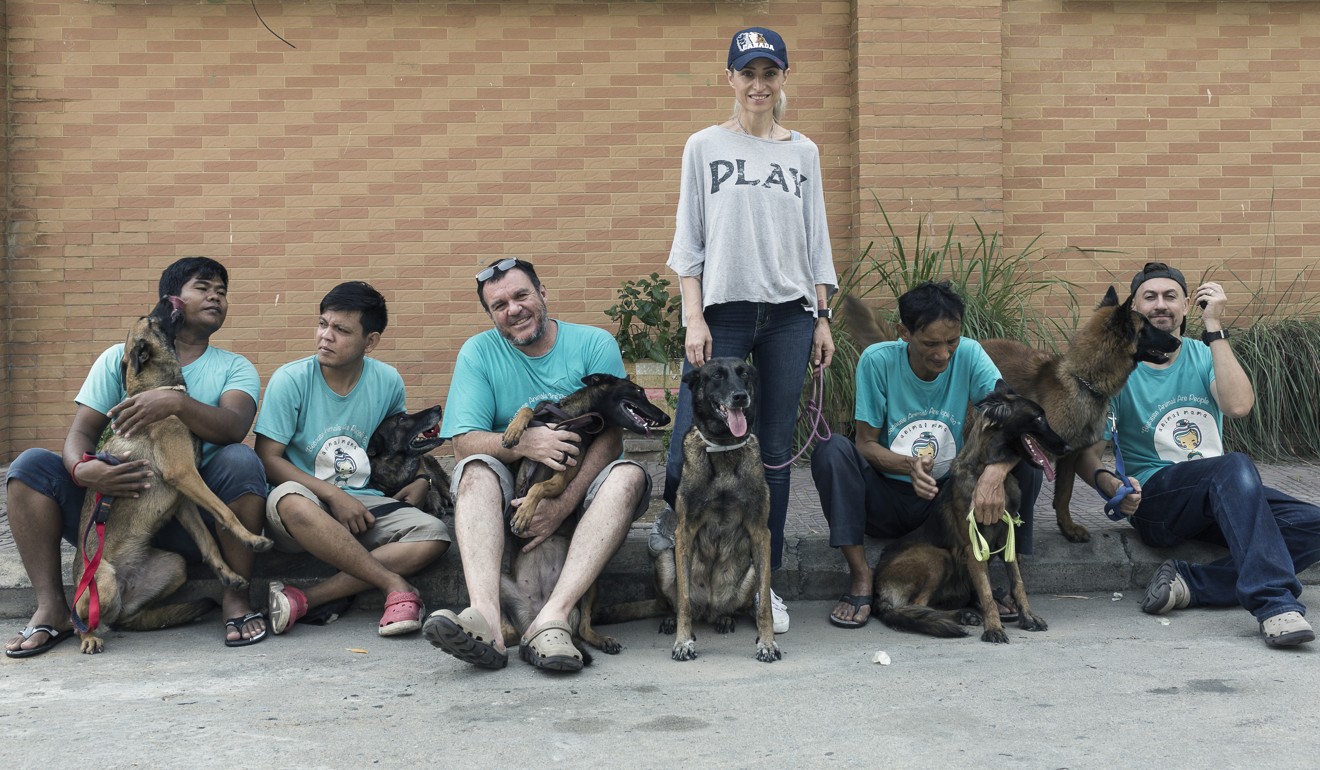
Retired landmine detection dogs find a home at Cambodian charity after working in ‘some of the most horrific parts of the world’
In the first of a three-part series on man’s best friend to mark the Year of the Dog, we talk to Home of Heroes founder Yulia Khouri on her retirement home for de-mining dogs in a country still littered with deadly unexploded ordnance
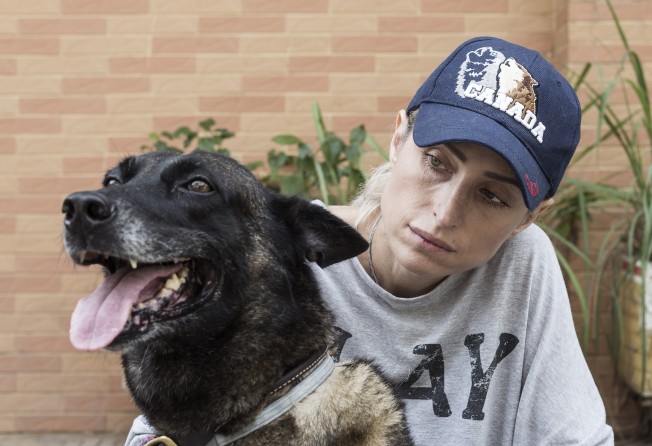
The brown and black Belgian Malinois jumps up at her owner, panting excitedly, before obediently following the order to sit. “This is Muriel,” says Yulia Khouri, founder of the Animal Mama Veterinary Hospital and Pet Wellness Centre in the Cambodian capital Phnom Penh, pointing to the athletic 12-year-old dog.
Khouri, a Canadian expat and long-time animal rights advocate, adopted Muriel in early 2016 when the dog retired after almost a decade spent helping to clear minefields in former war zones around the world.
Muriel ended her working life with a stint in Cambodia. She was one of the lucky ones: most retired de-mining dogs are euthanised. Touched by their plight, Khouri established Home of Heroes last year, the world’s first retirement home for de-mining dogs and Belgian Malinois pups that are not deemed up to the task.
The wounds of decades of conflict continue to scar Cambodia, one of the most heavily mined countries in the world. Civil war, US bombing campaigns and the brutal Khmer Rouge reign from 1975 to 1979 resulted in millions of landmines being planted and bombs dropped. The country was left littered with deadly unexploded ordnance – up to 10 million, according to the Cambodian Mine Action Centre (CMAC), a government organisation.

Since the mid-1990s, large-scale operations have been undertaken across the country by the CMAC and other local and international organisations to rid Cambodia of its deadly explosives, but there is still much work to do. The Cambodia Mine/ERW (Explosive Remnants of War) Victim Information System has recorded a total of 64,720 human casualties since 1979. Meanwhile, a report released in January by the Cambodian Mine Action and Victim Assistance Authority revealed there were 58 casualties across the country in 2017 – a 30 per cent drop in the number of victims the previous year.
Highly trained sniffer dogs like Muriel are an integral part of the teams that are working to clear Cambodia of its deadly unexploded ordnance as they meticulously sweep the land metre by metre. There have been no recorded deaths in the field to date.
“There are so many agencies working in de-mining in Cambodia and there is tonnes more work to do,” Khouri says. “That means there are a huge number of dogs that they are working with. After adopting Muriel, I started thinking, ‘What happens to these dogs when they retire?’”
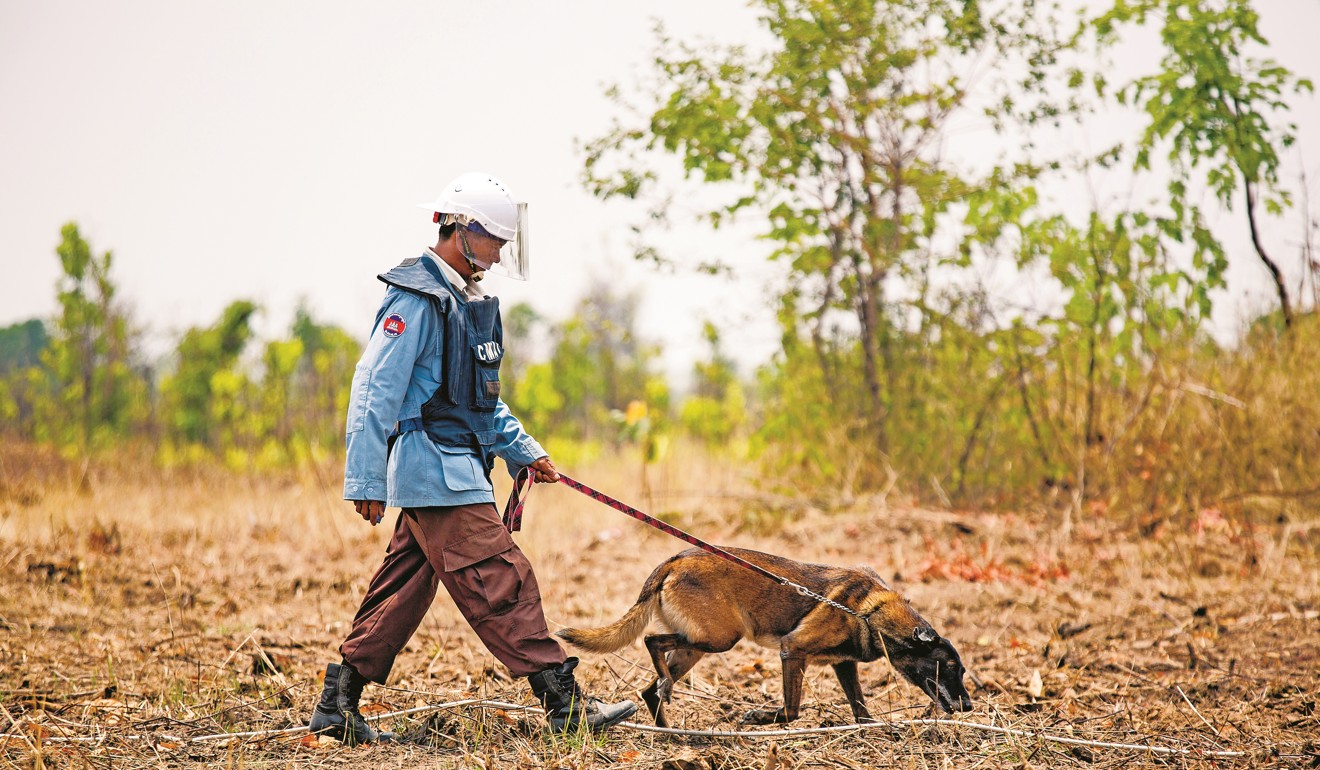
Khouri says there are no formal plans in place anywhere in the world for these animals when they reach the end of their working lives. She has been told that the majority are euthanised. The Belgian Malinois, a type of shepherd dog, can be difficult to find new homes for because of the vigorous exercise they need.
“They’re not pets and they’re not the easiest to handle,” Khouri says. “They are massive, strong, driven … so they are difficult to rehome. It’s really sad that there are hundreds of animals travelling the world to find explosives after wars and saving lots of lives, then here’s the thanks we give them. They are heroes.”
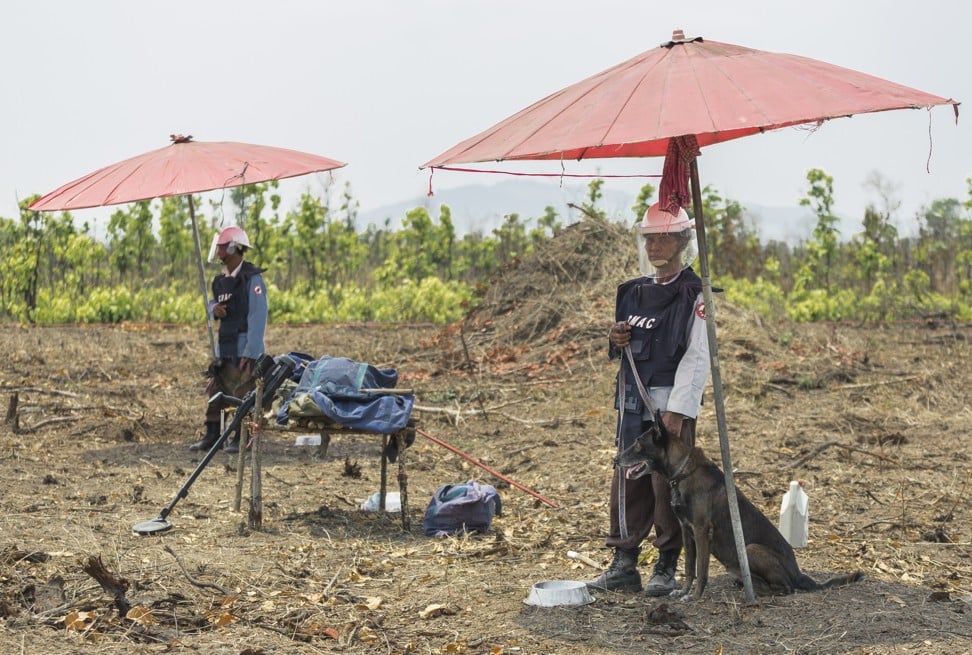
In the wrong hands, the dogs face the prospect of being killed and butchered, Khouri says. “For these dogs, Cambodia is probably the worst place to retire because there is a hugely popular meat market for dogs, and the darker and bigger the dog, the more expensive it is,” she explains. “These dogs are the best thing that could happen to a dog meat restaurant.”
The lack of qualified vets is another issue for potential adoptees in Cambodia. As working dogs, Belgian Malinois often need specialist care that can only be found in neighbouring Thailand, which makes ownership of the breed potentially expensive. “Animal welfare doesn’t come as a priority here,” Khouri says. “It is still the leading country in the world for human mortality from rabies. That alone tells you how difficult it is to be a dog in Cambodia.”
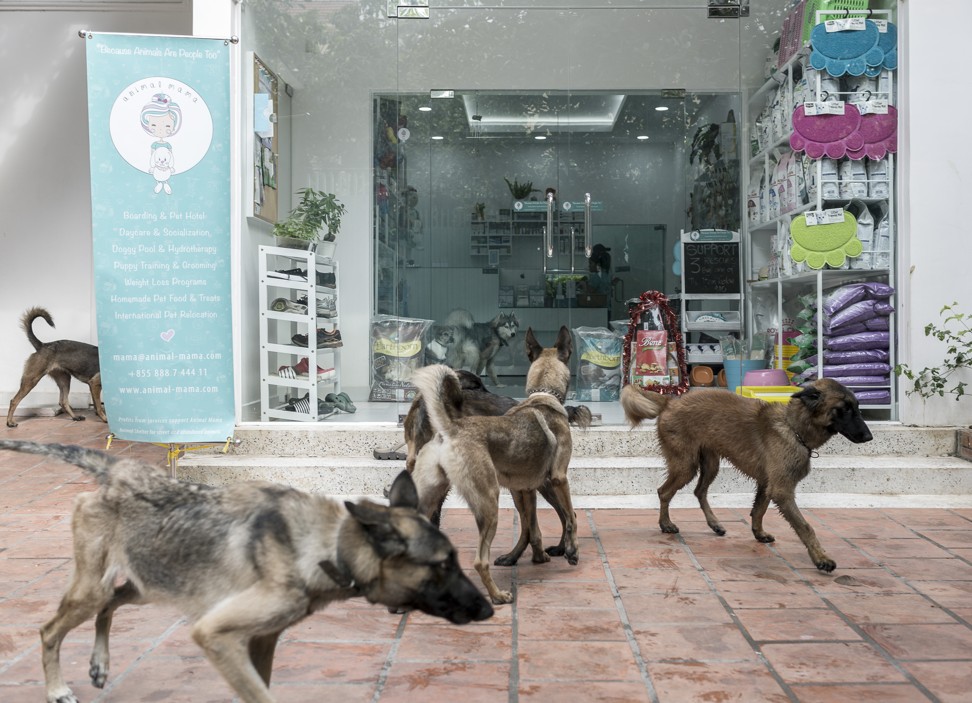
In late 2017, Animal Mama signed a Memorandum of Understanding with Norwegian People’s Aid (NPA), paving the way for NPA to hand over unsuitable and retired canines to Khouri’s Home of Heroes. The NPA has been carrying out de-mining work in Cambodia since 1992, and in May 2016 launched a puppy breeding programme in the town of Siem Reap, near the famed Angkor temples.
“It’s always a sensitive issue what happens to the dogs when they retire, so we supported this initiative straight away,” says Zlatko Vezilic, NPA programme manager in Cambodia. “Cambodia is not always a dog-friendly country, so carrying out regular checks with those that are adopted, and following up with vaccinations and [inquiries on] the type of food being given, is not that easy here.”
We want to provide respect to these dogs who are brought into this world for one specific reason: to clear mines
Pups from NPA’s breeding programme are put into soft training at the organisation’s Siem Reap-based training facility when they are just a few weeks old. They are gently prepped for life in the field by being kept active and mentally alert. NPA currently has 22 dogs undergoing training in Cambodia.
“We really know within a few weeks that some of them have good hunting behaviour and can be used in the field,” Vezilic says. “If we get 50 per cent who qualify, then that is a great result.”
Within a year, the number of pups on the programme will be whittled down through intensive training to safely detect explosives and alert their handlers. This is carried out through games, where the dogs are rewarded for finding explosive fragments hidden in rubber balls, walls, vehicles and buried in the ground.
By the time they are two years old, the dogs are ready to work in former and active war zones across the world.
“At about 15 months we can see they are ready, but they need to be mentally strong,” Vezilic says, adding that they will often carry out tours of Cambodia, Columbia and Iraq in their lifetime. Two of the dogs NPA is currently training will be sent to neighbouring Laos, and the organisation is preparing for trials in Vietnam.
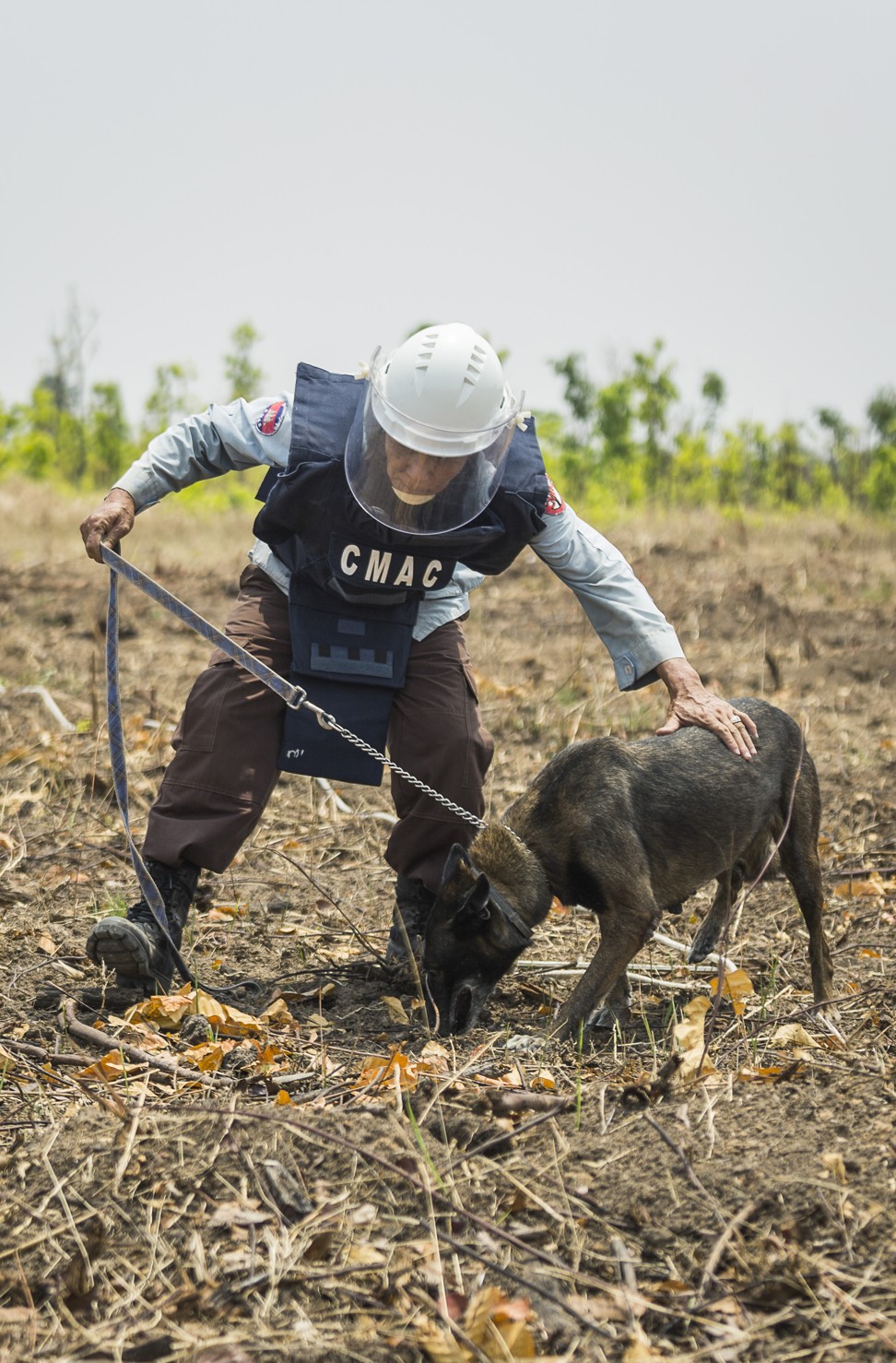
Vezilic says that among eight of the youngest dogs undergoing training, three or four are unlikely to qualify. The centre also has several dogs due to retire in the next two years. Most dogs work for about eight years, retiring at the age of nine or 10.
“This is where Home of Heroes comes in,” says Khouri, who has already taken in seven Belgian Malinois – five from NPA and two from CMAC. Among them, two are retired, two are disabled, two are puppies and one is ill. “We want to provide respect to these dogs who are brought into this world for one specific reason: to clear mines.”
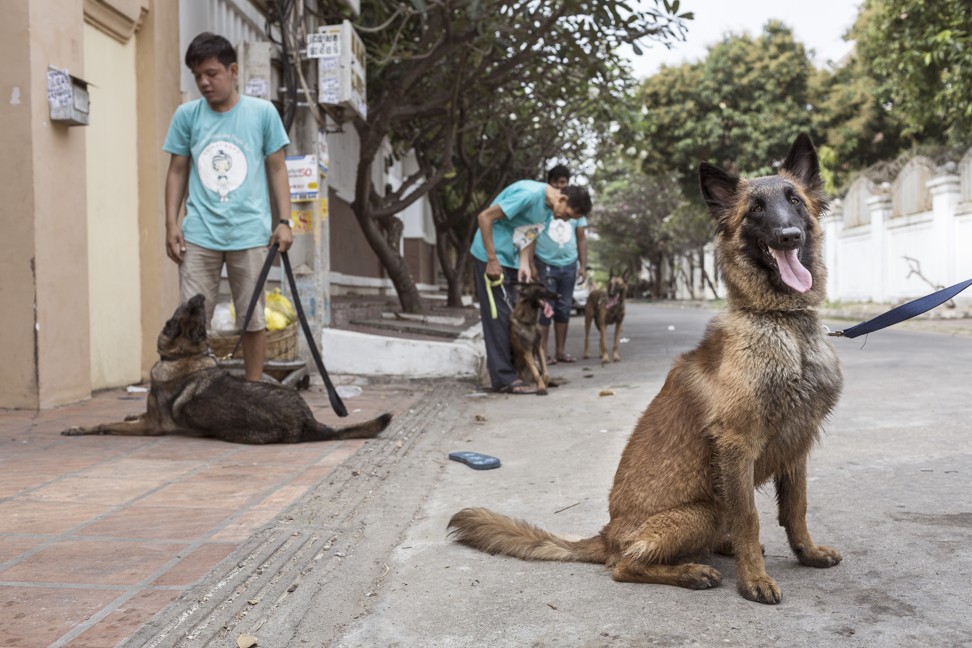
Although Khouri now homes the rejected and retired dogs at Animal Mama’s premises, she has plans to create a dedicated centre to cater to the inevitable increase in dogs Home of Heroes will be taking care of in the coming years. It will also serve as an education centre, with a small museum showcasing some of the explosives plucked from the ground. Visitors and locals will learn about the efforts being carried out to clear Cambodia of its deadly unexploded ordnance.
To ensure Home of Heroes is self-sufficient, Khouri is working on a programme to provide private security services. Under the scheme, security guards will be trained to work with the dogs to protect homes and businesses throughout the country. This will keep the highly intelligent Belgian Malinois dogs active, and provide a source of income.
“We think this is a great solution as these dogs need structure and crave attention,” says Khouri, adding that the dogs would still be owned by Home of Heroes, which would also be the guards’ employer.
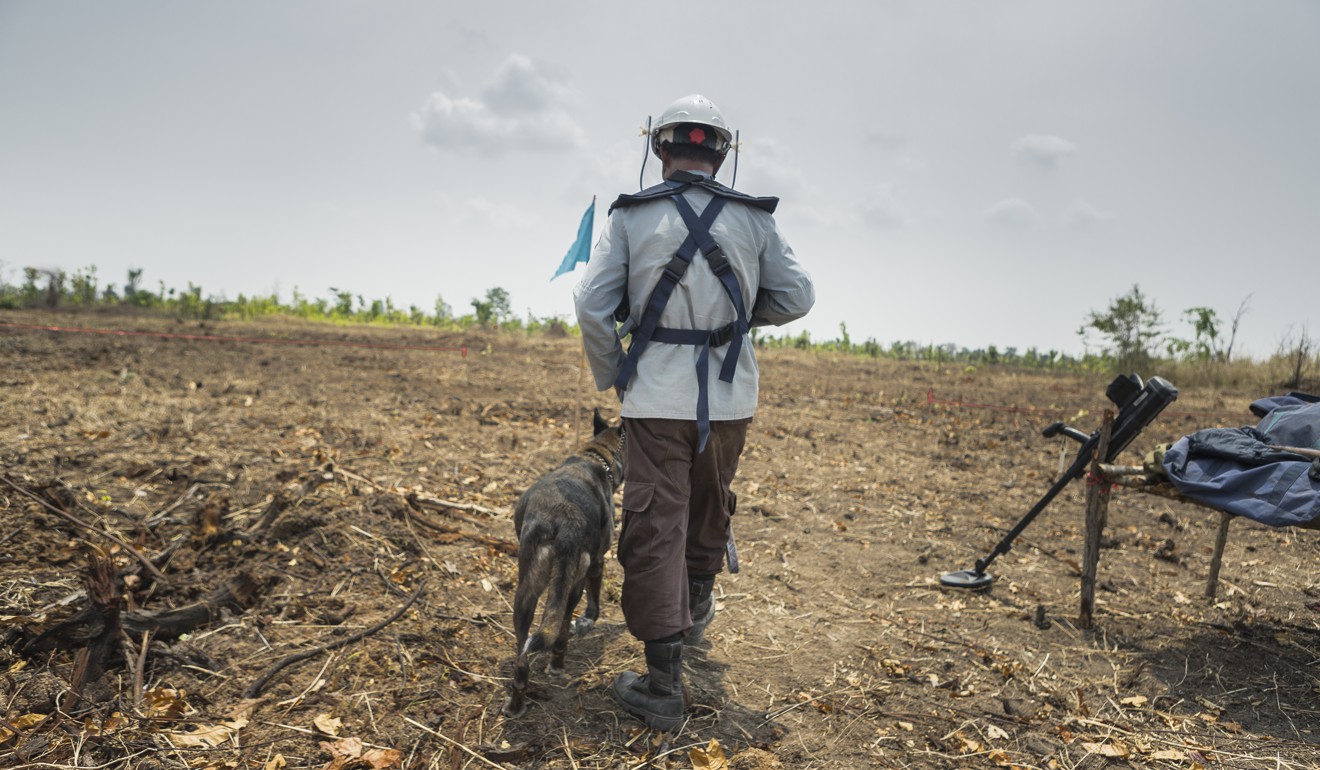
“There is something truly incredible about these dogs; they are the next level of canine,” she says. “They work in some of the most horrific parts of the world and this is next-level service to humanity.”
For more information, visit https://thehomeofheroes.org.
Next week: The sport of adu bagong. Dogs versus boars in rural Indonesia